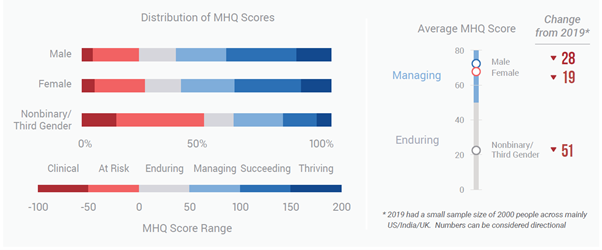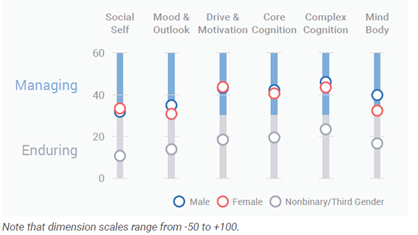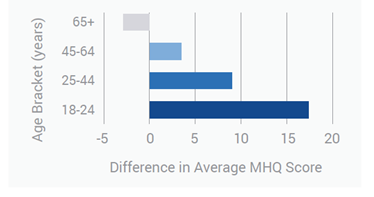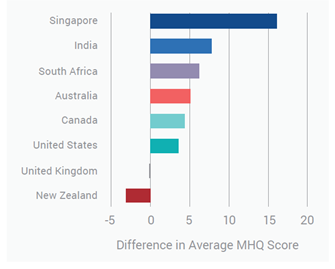Nonbinary adults face challenges to Mind Health And Wellbeing, research shows.
The American Psychiatric Association reports that 1 in 5 women have a mental health disorder. Other reports from the Trevor Project highlight that mental health challenges disproportionately impact those who identify as transgender. The Global Mind project, our global ongoing study of the evolving mental wellbeing, finds interesting gender differences and trends recently published in our Mental State of the World report.
Gender gaps in mental wellbeing
Overall, women had mental wellbeing scores just a few points lower overall relative to men. In contrast, those who identified as nonbinary/third gender had strikingly lower mental wellbeing compared to either men or women. On average, MHQ scores (a score that equates to overall mental wellbeing) were 50 points lower for nonbinary/third gender respondents (average MHQ of 22) compared to men, with more than 50 percent distressed or struggling. Those who responded as nonbinary/third gender also had the highest level of suicidal thoughts and intentions. This is in line with recent reports from the Trevor Project, which found that over half of transgender and nonbinary youth had seriously considered attempting suicide in the past year.

Those who responded as nonbinary/third gender also reported the greatest drop in mental wellbeing in 2020 compared to 2019, declining 51 points compared to a drop of 28 points in men and 19 points in women. This suggests that this group may also be disproportionately affected by the Covid-19 pandemic.
Gender differences in dimensions of mental wellbeing
Overall, men and women differed most along the dimensions of “Mind-Body Connection” and “Mood & Outlook” though there was still only a 3 to 5 percent difference along these dimension scales. Relative to men, women had greater experience of pain and feelings of fear and anxiety. Conversely, men had greater issues with addictions and feelings of empathy than women. For those who responded as nonbinary/third gender, the differences were around the dimensions of “Social Self” and “Drive & Motivation.” Worryingly, relative to men or women, this group had substantially more troubles with suicidal thoughts or intentions and a greater sense of being detached from reality.

A gender gap that diminishes with age…
While women were slightly lower overall, this was not the case for all age groups. For young adults aged 18 to 24, there was a sizable gender gap of 17 MHQ score points (6 percent of the MHQ scale) with men reporting higher mental wellbeing compared to women. The gap was progressively lower for older generations, reversing in direction for those aged 65+ with women faring better at these older ages. Notably, at all ages, the differences between men and women were many-fold smaller than the overall generational gaps we’ve talked about previously.

…and varies across countries
The gender gaps in mental wellbeing varied across the eight English-speaking countries, with most populations reporting slightly higher mental wellbeing for men compared to women. It was considerably larger, however, for Singapore (+16 MHQ points or 5 percent of the MHQ scale) compared to other countries. On the other hand, the United Kingdom had gender parity overall, and the gap was reversed in New Zealand where women were higher overall. In these countries, higher MHQ scores for men persisted in the 18 to 24 age range but quickly reached parity thereafter and reversed in favor of women after age 55.

Altogether, this suggests that social and cultural drivers may explain much of the overall differences between men and women although differences along specific dimensions may be biological in nature. On the other hand, the underlying causes of challenges for nonbinary/third gender individuals are more difficult to untangle. While the fraction of the global population who are nonbinary or third gender is estimated at approximately 0.5 percent, estimates are ambiguous (in our data 0.9 percent identified as being nonbinary). With studies suggesting that this percentage is rising, working to understand and mitigate the social, cultural and biological traumas and adversities that these individuals experience is essential.
The Global Mind project will be able to look longitudinally to see how these different populations fare in their next decade, providing increasingly deeper insight that can help drive mitigating strategies and track their success.

